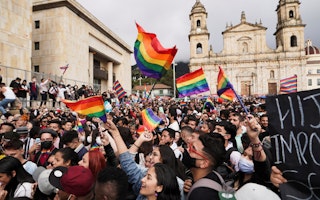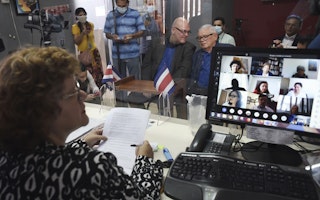Freedom of Expression Should Not Be a Luxury: LGBTI Rights in Georgia
By Zoe Brogden
Irakli Vacharadze, an alum of the Open Society Social Work Fellowship and Faculty Development Fellowship Programs, is the executive director of IDENTOBA, a Georgian NGO supported by the Open Society Human Rights Initiative. IDENTOBA works for equality for women and LGBTQI people in Georgia. I spoke with Irakli about the challenges faced by these marginalized populations.
What does “freedom of expression” mean for the populations IDENTOBA serves?
Defining freedom of expression for LGBTQI and other gender-based marginalized groups is both a simple and complex task. Freedom of expression, speaking from my position as a member of the gay community and as an activist, embodies our fight for physical survival and mental stability.
When society denies safety, empowerment, and space for these communities to express themselves, it effectively shuts them out of public policy and cultural debates and many other types of social participation. The hate in Georgia that is unleashed against LGBTQI persons, and non-dominant social groups in general, is so strong that when we speak out about the discrimination we suffer, it is equated with propaganda from the earlier Soviet period.
What are the main factors that prevent people in Georgia from freely defining their sexual or gendered identity? Do these factors differ in rural and urban environments?
I think the ability to prove that you are discriminated against socially, politically, legally, and economically depends on the amount of freedom of expression granted in any given society. In Georgia, it is severely limited. Rural communities are completely closed to LGBTQI people. This lack of presence combines with high levels of emigration, the general taboo surrounding talk about sexuality, poverty, and lack of access to modern media to breed enormous intolerance and stigma in rural areas. Isolation is the destiny of LGBTQI people there.
Have media or the government taken any actions to aid socially marginalized groups?
Until recently, in the Georgian Criminal Code, only certain crimes with a “hate motive” constituted the aggravating circumstances which lead to heavier sanctions. However, the provisions only referred to hatred toward racial, linguistic, religious, national, or ethnic groups, thus failing to include sexual orientation or gender identity.
IDENTOBA decided to launch a campaign to include sexual orientation and gender identity in the draft law. We sent several letters of appeal to the relevant Georgian authorities and international representations in Georgia. As a result of the campaign, the initiators of the draft law agreed to include sexual orientation and gender identity in 2012. The Georgian Criminal Code now recognizes homophobia as an aggravating circumstance for any crime committed, which is a huge step for securing a safer environment for LGBTQI people in Georgian society.
The above excerpt is from an interview with Irakli in the latest issue of ScholarForum, the annual journal of the Open Society Scholarship Programs. This issue also highlights the work and ideas of our grantees from Jordan, Lebanon, and Tajikistan on issues including women’s rights, education, and electoral developments in the Middle East.
Until November 2021, Zoe Brogden was a senior team manager for the Open Society Scholarship Programs.


